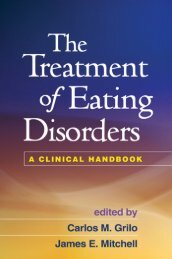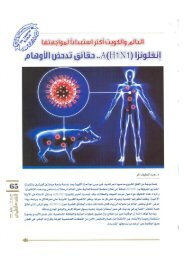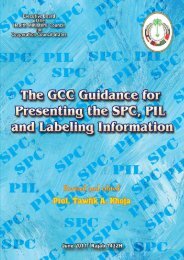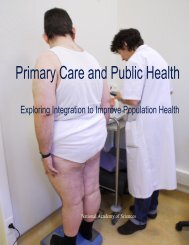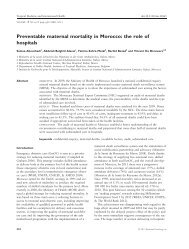- Page 2:
Obesity Epidemiology
- Page 6:
Obesity EpidemiologyFrank B. Hu, MD
- Page 10:
To Lisa
- Page 14:
AcknowledgmentsI am deeply indebted
- Page 18:
PrefaceSparked by a surging epidemi
- Page 22:
ContentsList of Invited Contributor
- Page 26:
List of Invited ContributorsGary G.
- Page 30:
Obesity Epidemiology
- Page 34:
Part IStudy Designs andMeasurements
- Page 38:
1Introduction to ObesityEpidemiolog
- Page 42:
Historical Context of Obesity Resea
- Page 46:
INTRODUCTION TO OBESITY EPIDEMIOLOG
- Page 50:
INTRODUCTION TO OBESITY EPIDEMIOLOG
- Page 54:
INTRODUCTION TO OBESITY EPIDEMIOLOG
- Page 58:
2Descriptive Epidemiologyof Obesity
- Page 62:
DESCRIPTIVE EPIDEMIOLOGY OF OBESITY
- Page 66:
DESCRIPTIVE EPIDEMIOLOGY OF OBESITY
- Page 70:
DESCRIPTIVE EPIDEMIOLOGY OF OBESITY
- Page 74:
DESCRIPTIVE EPIDEMIOLOGY OF OBESITY
- Page 78:
DESCRIPTIVE EPIDEMIOLOGY OF OBESITY
- Page 82:
ANALYTIC EPIDEMIOLOGIC DESIGNS IN O
- Page 86:
ANALYTIC EPIDEMIOLOGIC DESIGNS IN O
- Page 90:
ANALYTIC EPIDEMIOLOGIC DESIGNS IN O
- Page 94:
ANALYTIC EPIDEMIOLOGIC DESIGNS IN O
- Page 98:
ANALYTIC EPIDEMIOLOGIC DESIGNS IN O
- Page 102:
ANALYTIC EPIDEMIOLOGIC DESIGNS IN O
- Page 106:
INTERPRETING EPIDEMIOLOGIC EVIDENCE
- Page 110:
INTERPRETING EPIDEMIOLOGIC EVIDENCE
- Page 114:
INTERPRETING EPIDEMIOLOGIC EVIDENCE
- Page 118:
INTERPRETING EPIDEMIOLOGIC EVIDENCE
- Page 122:
INTERPRETING EPIDEMIOLOGIC EVIDENCE
- Page 126:
INTERPRETING EPIDEMIOLOGIC EVIDENCE
- Page 130:
INTERPRETING EPIDEMIOLOGIC EVIDENCE
- Page 134:
5Measurements of Adiposityand Body
- Page 138:
Table 5.1 A Comparison of Commonly
- Page 142:
MEASUREMENTS OF ADIPOSITY AND BODY
- Page 146:
MEASUREMENTS OF ADIPOSITY AND BODY
- Page 150:
MEASUREMENTS OF ADIPOSITY AND BODY
- Page 154:
MEASUREMENTS OF ADIPOSITY AND BODY
- Page 158:
MEASUREMENTS OF ADIPOSITY AND BODY
- Page 162:
MEASUREMENTS OF ADIPOSITY AND BODY
- Page 166:
MEASUREMENTS OF ADIPOSITY AND BODY
- Page 170:
MEASUREMENTS OF ADIPOSITY AND BODY
- Page 174:
MEASUREMENTS OF ADIPOSITY AND BODY
- Page 178:
MEASUREMENTS OF ADIPOSITY AND BODY
- Page 182:
MEASUREMENTS OF ADIPOSITY AND BODY
- Page 186:
MEASUREMENTS OF ADIPOSITY AND BODY
- Page 190:
MEASUREMENTS OF ADIPOSITY AND BODY
- Page 194:
MEASUREMENTS OF ADIPOSITY AND BODY
- Page 198:
DIETARY ASSESSMENT METHODS 8524-Hou
- Page 202:
DIETARY ASSESSMENT METHODS 87studie
- Page 206:
DIETARY ASSESSMENT METHODS 89and ob
- Page 210:
DIETARY ASSESSMENT METHODS 91200Fas
- Page 214:
DIETARY ASSESSMENT METHODS 93The gl
- Page 218:
DIETARY ASSESSMENT METHODS 95Some b
- Page 222:
DIETARY ASSESSMENT METHODS 97Table
- Page 226:
DIETARY ASSESSMENT METHODS 99diet b
- Page 230:
DIETARY ASSESSMENT METHODS 101Table
- Page 234:
DIETARY ASSESSMENT METHODS 103such
- Page 238:
DIETARY ASSESSMENT METHODS 105nutri
- Page 242:
DIETARY ASSESSMENT METHODS 107173 w
- Page 246:
DIETARY ASSESSMENT METHODS 109eithe
- Page 250:
DIETARY ASSESSMENT METHODS 111A rec
- Page 254:
DIETARY ASSESSMENT METHODS 11330. B
- Page 258:
DIETARY ASSESSMENT METHODS 11571. M
- Page 262:
DIETARY ASSESSMENT METHODS 117106.
- Page 266:
7Physical ActivityMeasurementsFrank
- Page 270:
PHYSICAL ACTIVITY MEASUREMENTS 121e
- Page 274:
PHYSICAL ACTIVITY MEASUREMENTS 123M
- Page 278:
• Describes intensity, frequency,
- Page 282:
PHYSICAL ACTIVITY MEASUREMENTS 127c
- Page 286:
PHYSICAL ACTIVITY MEASUREMENTS 129A
- Page 290:
PHYSICAL ACTIVITY MEASUREMENTS 131F
- Page 294:
PHYSICAL ACTIVITY MEASUREMENTS 133a
- Page 298:
PHYSICAL ACTIVITY MEASUREMENTS 135e
- Page 302:
PHYSICAL ACTIVITY MEASUREMENTS 137a
- Page 306:
PHYSICAL ACTIVITY MEASUREMENTS 139a
- Page 310:
PHYSICAL ACTIVITY MEASUREMENTS 1412
- Page 314:
PHYSICAL ACTIVITY MEASUREMENTS 1436
- Page 318:
PHYSICAL ACTIVITY MEASUREMENTS 1451
- Page 322:
Part IIEpidemiologic Studies ofCons
- Page 326:
8Metabolic Consequencesof ObesityFr
- Page 330:
METABOLIC CONSEQUENCES OF OBESITY 1
- Page 334:
METABOLIC CONSEQUENCES OF OBESITY 1
- Page 338:
METABOLIC CONSEQUENCES OF OBESITY 1
- Page 342:
METABOLIC CONSEQUENCES OF OBESITY 1
- Page 346:
METABOLIC CONSEQUENCES OF OBESITY 1
- Page 350:
METABOLIC CONSEQUENCES OF OBESITY 1
- Page 354:
METABOLIC CONSEQUENCES OF OBESITY 1
- Page 358:
METABOLIC CONSEQUENCES OF OBESITY 1
- Page 362:
METABOLIC CONSEQUENCES OF OBESITY 1
- Page 366:
METABOLIC CONSEQUENCES OF OBESITY 1
- Page 370:
METABOLIC CONSEQUENCES OF OBESITY 1
- Page 374: METABOLIC CONSEQUENCES OF OBESITY 1
- Page 378: OBESITY AND CARDIOVASCULAR DISEASE
- Page 382: OBESITY AND CARDIOVASCULAR DISEASE
- Page 386: OBESITY AND CARDIOVASCULAR DISEASE
- Page 390: OBESITY AND CARDIOVASCULAR DISEASE
- Page 394: OBESITY AND CARDIOVASCULAR DISEASE
- Page 398: Wesselet al. 46Li et al. 7Women’s
- Page 402: OBESITY AND CARDIOVASCULAR DISEASE
- Page 406: OBESITY AND CARDIOVASCULAR DISEASE
- Page 410: OBESITY AND CARDIOVASCULAR DISEASE
- Page 414: OBESITY AND CARDIOVASCULAR DISEASE
- Page 418: OBESITY AND CARDIOVASCULAR DISEASE
- Page 422: Table 10.1 Associations of Obesity
- Page 428: 200 EPIDEMIOLOGIC STUDIES OF CONSEQ
- Page 432: 202 EPIDEMIOLOGIC STUDIES OF CONSEQ
- Page 436: 204 EPIDEMIOLOGIC STUDIES OF CONSEQ
- Page 440: 206 EPIDEMIOLOGIC STUDIES OF CONSEQ
- Page 444: 208 EPIDEMIOLOGIC STUDIES OF CONSEQ
- Page 448: 210 EPIDEMIOLOGIC STUDIES OF CONSEQ
- Page 452: 212 EPIDEMIOLOGIC STUDIES OF CONSEQ
- Page 456: 214 EPIDEMIOLOGIC STUDIES OF CONSEQ
- Page 460: 11Obesity and MortalityFrank B. HuT
- Page 464: 218 EPIDEMIOLOGIC STUDIES OF CONSEQ
- Page 468: 220 EPIDEMIOLOGIC STUDIES OF CONSEQ
- Page 472: 222 EPIDEMIOLOGIC STUDIES OF CONSEQ
- Page 476:
224 EPIDEMIOLOGIC STUDIES OF CONSEQ
- Page 480:
226 EPIDEMIOLOGIC STUDIES OF CONSEQ
- Page 484:
228 EPIDEMIOLOGIC STUDIES OF CONSEQ
- Page 488:
230 EPIDEMIOLOGIC STUDIES OF CONSEQ
- Page 492:
232 EPIDEMIOLOGIC STUDIES OF CONSEQ
- Page 496:
12Obesity and Health-RelatedQuality
- Page 500:
236 EPIDEMIOLOGIC STUDIES OF CONSEQ
- Page 504:
238 EPIDEMIOLOGIC STUDIES OF CONSEQ
- Page 508:
Table 12.1 continuedAuthors(Year)Da
- Page 512:
Table 12.1 continuedAuthors(Year)Da
- Page 516:
Table 12.1 continuedAuthors(Year)Da
- Page 520:
Table 12.1 continuedAuthors(Year)Da
- Page 524:
Table 12.2 Studies of Weight Change
- Page 528:
250 EPIDEMIOLOGIC STUDIES OF CONSEQ
- Page 532:
Table 12.3 Studies of Obesity and H
- Page 536:
Table 12.3 continuedAuthors(Year)Da
- Page 540:
256 EPIDEMIOLOGIC STUDIES OF CONSEQ
- Page 544:
258 EPIDEMIOLOGIC STUDIES OF CONSEQ
- Page 548:
260 EPIDEMIOLOGIC STUDIES OF CONSEQ
- Page 552:
262 EPIDEMIOLOGIC STUDIES OF CONSEQ
- Page 556:
264 EPIDEMIOLOGIC STUDIES OF CONSEQ
- Page 560:
266 EPIDEMIOLOGIC STUDIES OF CONSEQ
- Page 564:
268 EPIDEMIOLOGIC STUDIES OF CONSEQ
- Page 568:
270 EPIDEMIOLOGIC STUDIES OF CONSEQ
- Page 572:
This page intentionally left blank
- Page 576:
This page intentionally left blank
- Page 580:
276 EPIDEMIOLOGIC STUDIES OF DETERM
- Page 584:
278 EPIDEMIOLOGIC STUDIES OF DETERM
- Page 588:
280 EPIDEMIOLOGIC STUDIES OF DETERM
- Page 592:
282 EPIDEMIOLOGIC STUDIES OF DETERM
- Page 596:
284 EPIDEMIOLOGIC STUDIES OF DETERM
- Page 600:
286 EPIDEMIOLOGIC STUDIES OF DETERM
- Page 604:
288 EPIDEMIOLOGIC STUDIES OF DETERM
- Page 608:
290 EPIDEMIOLOGIC STUDIES OF DETERM
- Page 612:
292 EPIDEMIOLOGIC STUDIES OF DETERM
- Page 616:
294 EPIDEMIOLOGIC STUDIES OF DETERM
- Page 620:
296 EPIDEMIOLOGIC STUDIES OF DETERM
- Page 624:
298 EPIDEMIOLOGIC STUDIES OF DETERM
- Page 628:
300 EPIDEMIOLOGIC STUDIES OF DETERM
- Page 632:
302 EPIDEMIOLOGIC STUDIES OF DETERM
- Page 636:
304 EPIDEMIOLOGIC STUDIES OF DETERM
- Page 640:
306 EPIDEMIOLOGIC STUDIES OF DETERM
- Page 644:
308 EPIDEMIOLOGIC STUDIES OF DETERM
- Page 648:
310 EPIDEMIOLOGIC STUDIES OF DETERM
- Page 652:
312 EPIDEMIOLOGIC STUDIES OF DETERM
- Page 656:
314 EPIDEMIOLOGIC STUDIES OF DETERM
- Page 660:
316 EPIDEMIOLOGIC STUDIES OF DETERM
- Page 664:
318 EPIDEMIOLOGIC STUDIES OF DETERM
- Page 668:
16Sleep Deprivationand ObesitySanja
- Page 672:
322 EPIDEMIOLOGIC STUDIES OF DETERM
- Page 676:
Table 16.1 continuedAuthor/Year/Cou
- Page 680:
326 EPIDEMIOLOGIC STUDIES OF DETERM
- Page 684:
Table 16.2 continuedAuthor/Year/Cou
- Page 688:
Table 16.2 continuedAuthor YearCoun
- Page 692:
332 EPIDEMIOLOGIC STUDIES OF DETERM
- Page 696:
334 EPIDEMIOLOGIC STUDIES OF DETERM
- Page 700:
336 EPIDEMIOLOGIC STUDIES OF DETERM
- Page 704:
338 EPIDEMIOLOGIC STUDIES OF DETERM
- Page 708:
340 EPIDEMIOLOGIC STUDIES OF DETERM
- Page 712:
17Social Determinants ofObesityGary
- Page 716:
344 EPIDEMIOLOGIC STUDIES OF DETERM
- Page 720:
346 EPIDEMIOLOGIC STUDIES OF DETERM
- Page 724:
348 EPIDEMIOLOGIC STUDIES OF DETERM
- Page 728:
350 EPIDEMIOLOGIC STUDIES OF DETERM
- Page 732:
352 EPIDEMIOLOGIC STUDIES OF DETERM
- Page 736:
354 EPIDEMIOLOGIC STUDIES OF DETERM
- Page 740:
356 EPIDEMIOLOGIC STUDIES OF DETERM
- Page 744:
358 EPIDEMIOLOGIC STUDIES OF DETERM
- Page 748:
360 EPIDEMIOLOGIC STUDIES OF DETERM
- Page 752:
362 EPIDEMIOLOGIC STUDIES OF DETERM
- Page 756:
364 EPIDEMIOLOGIC STUDIES OF DETERM
- Page 760:
366 EPIDEMIOLOGIC STUDIES OF DETERM
- Page 764:
368 EPIDEMIOLOGIC STUDIES OF DETERM
- Page 768:
370 EPIDEMIOLOGIC STUDIES OF DETERM
- Page 772:
372 EPIDEMIOLOGIC STUDIES OF DETERM
- Page 776:
374 EPIDEMIOLOGIC STUDIES OF DETERM
- Page 780:
376 EPIDEMIOLOGIC STUDIES OF DETERM
- Page 784:
378 EPIDEMIOLOGIC STUDIES OF DETERM
- Page 788:
380 EPIDEMIOLOGIC STUDIES OF DETERM
- Page 792:
382 EPIDEMIOLOGIC STUDIES OF DETERM
- Page 796:
Table 18.3 continuedFirst Author(Ye
- Page 800:
Table 18.3 continuedFirst Author(Ye
- Page 804:
388 EPIDEMIOLOGIC STUDIES OF DETERM
- Page 808:
390 EPIDEMIOLOGIC STUDIES OF DETERM
- Page 812:
392 EPIDEMIOLOGIC STUDIES OF DETERM
- Page 816:
394 EPIDEMIOLOGIC STUDIES OF DETERM
- Page 820:
396 EPIDEMIOLOGIC STUDIES OF DETERM
- Page 824:
398 EPIDEMIOLOGIC STUDIES OF DETERM
- Page 828:
400 EPIDEMIOLOGIC STUDIES OF DETERM
- Page 832:
402 EPIDEMIOLOGIC STUDIES OF DETERM
- Page 836:
404 EPIDEMIOLOGIC STUDIES OF DETERM
- Page 840:
406 EPIDEMIOLOGIC STUDIES OF DETERM
- Page 844:
408 EPIDEMIOLOGIC STUDIES OF DETERM
- Page 848:
410 EPIDEMIOLOGIC STUDIES OF DETERM
- Page 852:
412 EPIDEMIOLOGIC STUDIES OF DETERM
- Page 856:
414 EPIDEMIOLOGIC STUDIES OF DETERM
- Page 860:
20Predictors and Consequencesof Chi
- Page 864:
418 EPIDEMIOLOGIC STUDIES OF DETERM
- Page 868:
420 EPIDEMIOLOGIC STUDIES OF DETERM
- Page 872:
422 EPIDEMIOLOGIC STUDIES OF DETERM
- Page 876:
424 EPIDEMIOLOGIC STUDIES OF DETERM
- Page 880:
426 EPIDEMIOLOGIC STUDIES OF DETERM
- Page 884:
428 EPIDEMIOLOGIC STUDIES OF DETERM
- Page 888:
430 EPIDEMIOLOGIC STUDIES OF DETERM
- Page 892:
432 EPIDEMIOLOGIC STUDIES OF DETERM
- Page 896:
434 EPIDEMIOLOGIC STUDIES OF DETERM
- Page 900:
436 EPIDEMIOLOGIC STUDIES OF DETERM
- Page 904:
438 EPIDEMIOLOGIC STUDIES OF DETERM
- Page 908:
440 EPIDEMIOLOGIC STUDIES OF DETERM
- Page 912:
442 EPIDEMIOLOGIC STUDIES OF DETERM
- Page 916:
444 EPIDEMIOLOGIC STUDIES OF DETERM
- Page 920:
Table 21.2 Summary of Meta-Analyses
- Page 924:
448 EPIDEMIOLOGIC STUDIES OF DETERM
- Page 928:
450 EPIDEMIOLOGIC STUDIES OF DETERM
- Page 932:
452 EPIDEMIOLOGIC STUDIES OF DETERM
- Page 936:
454 EPIDEMIOLOGIC STUDIES OF DETERM
- Page 940:
456 EPIDEMIOLOGIC STUDIES OF DETERM
- Page 944:
458 EPIDEMIOLOGIC STUDIES OF DETERM
- Page 948:
460 EPIDEMIOLOGIC STUDIES OF DETERM
- Page 952:
462 EPIDEMIOLOGIC STUDIES OF DETERM
- Page 956:
464 EPIDEMIOLOGIC STUDIES OF DETERM
- Page 960:
466 EPIDEMIOLOGIC STUDIES OF DETERM
- Page 964:
468 EPIDEMIOLOGIC STUDIES OF DETERM
- Page 968:
470 EPIDEMIOLOGIC STUDIES OF DETERM
- Page 972:
472 EPIDEMIOLOGIC STUDIES OF DETERM
- Page 976:
Table 22.5 Intervention Studies of
- Page 980:
Table 22.5 continuedAuthors (Year)
- Page 984:
478 EPIDEMIOLOGIC STUDIES OF DETERM
- Page 988:
480 EPIDEMIOLOGIC STUDIES OF DETERM
- Page 992:
482 EPIDEMIOLOGIC STUDIES OF DETERM
- Page 996:
484 EPIDEMIOLOGIC STUDIES OF DETERM
- Page 1000:
This page intentionally left blank
- Page 1004:
488 INDEXBiomarkers (contd.)of isof
- Page 1008:
490 INDEXDual-energy x-ray absorpti
- Page 1012:
492 INDEXHeywood case, 99High-densi
- Page 1016:
494 INDEXNational Longitudinal Stud
- Page 1020:
496 INDEXResearch Clinics Questionn
- Page 1024:
498 INDEXWestern Electricdietary hi





